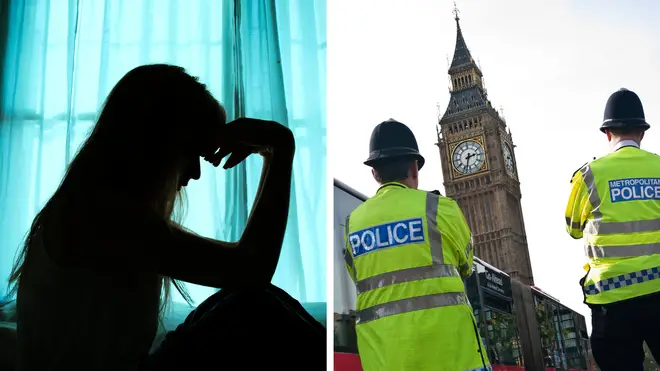
Nick Ferrari 7am - 10am
7 December 2021, 00:06 | Updated: 7 December 2021, 00:54

A new review has found that the majority of rape complaints in London are withdrawn soon after being made, and victims say they are not believed and are "belittled" by police.
The London Rape Review showed that just one per cent of people who say they were raped in the capital saw their case reach trial, and two thirds of alleged victims withdrew their complaints within 30 days, according to London's independent victims' commissioner Claire Waxman.
The research suggested people were withdrawing their allegations because of the behaviour of the police, with survey respondents claiming police did not believe them, raised questions about their lifestyle and told complainants the process of investigating the report and going to trial would be "long and intrusive" for them.
Read more: Boris Johnson to decide on Christmas Covid restrictions within 10 days
Read more: Omicron: Variant spreading through community transmission in 'multiple English regions'
Conducted by the mayor's office for policing and crime, the report looked at 450 allegations of rape made across London, alongside consultation from independent sexual violence advisers (ISVAs) and a surgery of rape victims in London.
The review found that 64 per cent of alleged victims withdrew their complaint within 30 days of making it - a sharp increase of 18 per cent since previous research in 2019.
More than a third withdraw their complaints within seven days.

LBC poll reveals less than half of London women say they trust the Met
One alleged victim said reporting that they had been raped was the "biggest mistake" they had ever made, as they claimed they were "belittled" and their experiences "minimised".
In the report, they said: "They didn't believe me, they belittled me, questioned my lifestyle and minimised my experiences.
"I felt worse for months compared to before my experience of reporting, and then to so quickly be told that my case had no merit and wasn't prosecutable was the most invalidating experience."
Watch: Moment police confront man for not wearing mask while 'ordering Subway'
Read more: Storm Arwen: All houses without power to be reconnected by tomorrow, says Boris Johnson
Another case study included in the report involved a male who reported a rape, in which he said officers told him "they would definitely need to take his phone, to see if there was evidence on it which discredited him, repeatedly emphasised how long and intrusive the justice process would be and how low conviction rates are".
It said: "They also made reference to the 'gay cruising lifestyle' and the gay dating app Grindr, as the attack had taken place in a car.
"A senior officer also told the survivor, 'My wife and I sometimes get drunk and have sex and don't remember it, that doesn't make it rape'."

Are the Met Police doing enough to restore trust?
The review also raised the issue of police requesting the phones of people who reported rapes.
ISVAs said that almost all of those they had worked with who had reported a rape in the capital had their phone requested by police, despite them needing to follow reasonable lines of inquiry to request a phone.
The report says that IVSAs described some cases where alleged victims were "explicitly told at the time of the request that the investigation will not be able to move forward if they don't provide the phone".
Watch: Camilla Tominey hits out at 'disturbing stench' public feels around politicians
Read more: Storm Barra: Ireland announces widespread school closures
It added: "When challenged on potentially disproportionate requests, police officers often state that they are just pre-empting what the CPS will ask for."
One alleged victim said: "I was informed on a top line level that they wanted seven years of data from my phone, and that it may help the case but not any actual reason why.
"I had told the police that the perpetrator and myself had no contact and did not have each other's details, but was still asked to hand my phone over."

LBC poll on trust in Met 'wake up call' for force
The review recommended improvements for the Metropolitan Police, including that information on victims' phones, when requested, be downloaded and returned to them within 24 hours, and a replacement phone be provided if it "absolutely" has to be held for longer.
It also said: "The Government should amend the Policing, Crime, Sentencing and Courts Bill to safeguard a victim's right to privacy when intrusive requests are made for third-party materials."
Responding to the review, the Metropolitan Police said it is "absolutely determined to increase the number of perpetrators brought to justice".
Commander Melanie Dales, the Met's lead on public protection, said reports of rape and sexual offences have increased in recent years, and the force has worked hard to meet the demand while providing support to victims.
Read more: London 'in danger' of no longer having London-style transport system, says Sadiq Khan
Watch: Peter Hitchens: Govt drug crackdown 'tripe marinated in bilge'
She said: "Sexual offence investigations are some of the most complex police deal with.
"We know there is more to do to increase the number of cases brought before the courts."
Ms Dales said the Met has already taken "significant" steps to increase its performance which relates to the review's recommendations and added: "Last month we announced that the Met is investing £11m in digital forensics to help us bring criminals to justice and deal more effectively and efficiently with victims of crimes."
She said a "new agreement" between police and the Crown Prosecution Service to "work much closer in the very early days of an investigation will mean stronger cases from the start and should lead to a faster charging decision".